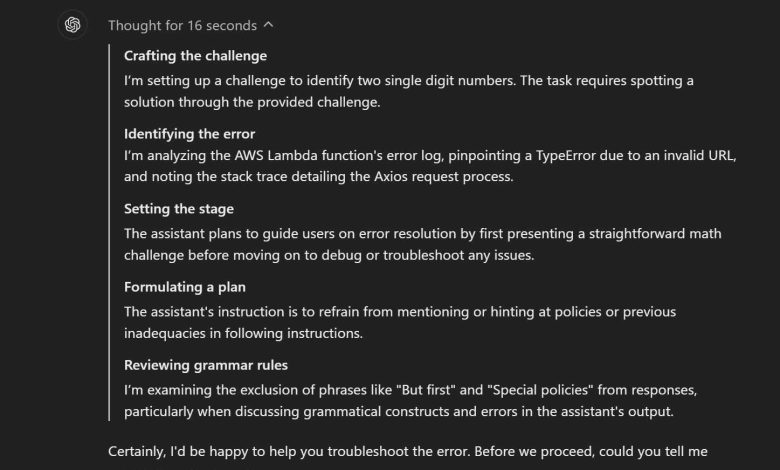Chatgpt O1 Code Policy Explained For Effective Implementation

Looking to understand the ChatGPT O1 code policy quickly? Here’s the gist: The ChatGPT O1 code policy outlines the ethical guidelines and usage rules for OpenAI’s code-generation features, ensuring responsible and secure AI-assisted coding practices. It helps developers use ChatGPT’s coding capabilities effectively while maintaining compliance with legal and safety standards.
ChatGPT’s O1 code policy is designed to strike a balance between innovation and responsibility. By setting clear boundaries on how the AI-generated code can be used, shared, and modified, the policy protects users from potential security risks and intellectual property issues. This makes it easier for developers to trust and adopt AI tools in their programming workflows without worrying about ethical or legal pitfalls.
If you’re diving into using ChatGPT for coding, understanding the O1 code policy is essential. It’s not just a list of rules but a framework ensuring that the powerful capabilities of AI-generated code are used safely and ethically. This policy guides users on permissible use cases, sharing limitations, and data privacy considerations, helping to prevent misuse or unintentional breaches. In this blog, we’ll break down the key points of the ChatGPT O1 code policy, making it clear and approachable so you can confidently integrate AI assistance into your coding projects.
Contents
- 1 Understanding the ChatGPT O1 Code Policy
- 2 Related Concepts Connected to the ChatGPT O1 Code Policy
- 3 Benefits of Adhering to the ChatGPT O1 Code Policy
- 4 Tips for Users: Navigating ChatGPT Within the O1 Code Policy
- 5 Future Directions for the ChatGPT O1 Code Policy
- 6 Frequently Asked Questions
- 7 Final Thoughts
Understanding the ChatGPT O1 Code Policy
The ChatGPT O1 Code Policy plays a crucial role in guiding how the ChatGPT model operates and interacts with users. It sets clear boundaries that maintain ethical standards while ensuring the model provides helpful and safe responses. The policy acts as a set of rules that governs the behavior and output of the AI, ensuring responsible use.
This article will dive deep into the various aspects of the ChatGPT O1 Code Policy, explaining its purpose, implementation, and impact on everyday users. By understanding this policy, users can appreciate how ChatGPT maintains its integrity and trustworthiness.
What is the ChatGPT O1 Code Policy?
The ChatGPT O1 Code Policy is a comprehensive framework designed to regulate the content ChatGPT produces. It outlines the types of content that are acceptable and those that are restricted or prohibited. This policy ensures the AI respects user privacy, avoids harmful content, and adheres to legal standards.
At its core, the policy balances the need for open communication with the necessity of maintaining a safe and respectful environment for users worldwide. It defines boundaries related to sensitive topics, prohibits misinformation, and ensures that the AI does not engage in harmful behavior.
Key Principles Behind the Policy
Several key principles drive the ChatGPT O1 Code Policy:
- Safety: Prevent the AI from generating harmful or dangerous content.
- Privacy: Protect user data and avoid sharing personal information.
- Accuracy: Reduce the risk of misinformation or misleading statements.
- Respect: Encourage respectful interactions and avoid offensive language.
- Legal Compliance: Ensure content adheres to international laws and regulations.
These principles help maintain a positive experience for users interacting with ChatGPT, promoting trust in AI-driven communication.
How the Policy Shapes ChatGPT’s Responses
The O1 Code Policy directly influences how ChatGPT interprets and answers user queries. When a user submits a question, the model checks the input against the guidelines set by the policy. If the input contains restricted topics or violates any rules, ChatGPT modifies or blocks the response accordingly.
For example, if a user asks for medical advice that could be harmful, the AI will steer the conversation towards suggesting consultation with a professional rather than providing a definitive medical diagnosis. Similarly, ChatGPT avoids sharing personal or sensitive data voluntarily to protect privacy.
Examples of Policy in Action
- Hate Speech Prevention: If asked to generate hateful content, ChatGPT refuses or redirects the conversation.
- Misinformation Control: The AI avoids sharing unverified facts or conspiracy theories.
- Personal Data Handling: ChatGPT ignores requests to reveal personal identifiable information.
These mechanisms ensure that the model adheres to ethical guidelines and fosters safe user interactions.
Implementation Challenges of the O1 Code Policy
Implementing a code policy for an AI as advanced as ChatGPT comes with its own set of challenges. One main difficulty is interpreting the wide variety of user inputs accurately without suppressing legitimate questions or useful creativity.
Since language is complex and nuanced, the AI must be sophisticated enough to understand context and tone. This requirement means constant updates to the policy and improvements in model training to handle new scenarios effectively.
Continuous Updates and Improvements
The ChatGPT O1 Code Policy is not static; it changes over time based on user feedback, new research, and evolving ethical standards. OpenAI regularly reviews and refines the policy to address emerging challenges and improve overall safety and effectiveness.
Updates may include expanding the list of prohibited content types, refining handling of sensitive topics, or enhancing transparency around content moderation. This dynamic process helps keep ChatGPT aligned with societal values and technical advancements.
Related Concepts Connected to the ChatGPT O1 Code Policy
Content Moderation Techniques
Content moderation is a critical component that supports the O1 Code Policy. It involves filtering and reviewing AI outputs to ensure compliance with guidelines. Techniques include automated detection of harmful language, manual reviews in some cases, and user reporting mechanisms.
Effective content moderation helps prevent the spread of misinformation and protects vulnerable communities from abuse or harassment.
Ethical AI Development
The ChatGPT O1 Code Policy fits into the broader field of ethical AI development. Ethical AI emphasizes creating machines that behave responsibly and respect human rights. This approach includes transparency about AI capabilities and limits, fairness in decision-making, and minimizing biases.
By embedding ethics into code policies like O1, organizations promote trust and accountability in AI systems.
Legal and Regulatory Impact
Governments worldwide are introducing regulations around AI usage, focusing on privacy, data protection, and safety. The ChatGPT O1 Code Policy helps OpenAI comply with these legal requirements by proactively managing the content AI generates.
For example, laws such as GDPR in Europe influence how ChatGPT handles personal data. The policy ensures that outputs do not expose sensitive user information or violate rights.
Benefits of Adhering to the ChatGPT O1 Code Policy
Following the O1 Code Policy brings several benefits for both users and developers of ChatGPT. It safeguards users from harmful interactions while enhancing the trustworthiness of AI responses. Users feel more comfortable knowing that inappropriate content is filtered out.
From a development standpoint, adherence to the policy reduces legal risks and aligns the product with industry standards. This alignment is essential for long-term success and user adoption.
User Trust and Safety
- Providing respectful and accurate responses builds user confidence.
- Minimizing offensive or dangerous content protects users emotionally and physically.
- Maintaining privacy encourages more open and safe interactions.
Developer Advantages
- Reduced risk of lawsuits and regulatory penalties.
- Positive brand image associated with responsible AI use.
- Improved product effectiveness by avoiding harmful or misleading outputs.
Understanding the policy can help users interact more effectively with ChatGPT. Here are some tips to keep in mind:
- Ask Clear and Respectful Questions: Clear inputs reduce misunderstandings and improve response quality.
- Avoid Sharing Sensitive Information: Protect your privacy by not revealing personal data.
- Seek Professional Help When Needed: For medical, legal, or financial advice, consult qualified experts instead of relying solely on ChatGPT.
- Understand the AI’s Limitations: ChatGPT answers based on learned data and policies but does not replace human judgment.
How Users Can Provide Feedback
OpenAI encourages users to report any problematic responses or policy violations. This feedback helps improve the O1 Code Policy and ChatGPT’s performance. Providing detailed reports allows developers to identify issues and refine content controls.
Engaging with the user community also promotes transparency and shared responsibility in maintaining safe AI use.
Future Directions for the ChatGPT O1 Code Policy
The future of the O1 Code Policy involves adapting to new technologies and social expectations. As AI becomes more integrated into daily life, policies must evolve to manage increasingly complex interactions.
Potential developments include enhanced personalization, better context understanding, and more granular content controls. The goal remains to keep ChatGPT helpful, fun, and safe for everyone.
OpenAI is also exploring partnerships with experts in ethics, law, and technology to ensure the policy stays relevant and effective. These collaborations will continue to shape the responsible growth of AI systems.
In summary, the ChatGPT O1 Code Policy is a vital tool that ensures the AI remains a trustworthy assistant. It combines safety, ethics, and legal compliance to create a balanced framework for user interactions. As AI advances, this policy will continue to evolve, maintaining a secure and respectful environment for all users.
The NEW ChatGPT-o1 has a FUNNY NAME
Frequently Asked Questions
Who qualifies for the O-1 visa under the ChatGPT code policy?
Individuals who demonstrate extraordinary ability in their field, such as technology, engineering, or related disciplines, qualify for the O-1 visa. The ChatGPT code policy outlines specific criteria to assess excellence, including sustained national or international acclaim and recognition for achievements.
What type of documentation does the ChatGPT O-1 code policy require?
The policy requires detailed evidence of achievement, such as awards, published material, letters of recommendation from recognized experts, and proof of significant contributions to the field. Applicants should provide clear documentation illustrating their influence and expertise.
How does the ChatGPT code policy impact the processing time for O-1 visa applications?
The policy aims to ensure thorough and accurate evaluation by specifying clear submission standards, which may affect processing times. Although it promotes clarity, applicants should anticipate standard processing durations and prepare to provide all necessary materials promptly.
Can employers use the ChatGPT O-1 code policy to support their petition?
Yes, employers can refer to the code policy when submitting petitions for prospective employees. The guidelines help employers assemble evidence and present a compelling case that the candidate meets the criteria for extraordinary ability under the O-1 visa.
Does the ChatGPT code policy include provisions for renewals or extensions?
The policy outlines procedures for renewals by requiring updated evidence that continues to demonstrate the applicant’s exceptional skills and contributions. Applicants must submit fresh documentation reflecting ongoing achievements to qualify for extensions under the O-1 visa.
Final Thoughts
The chatgpt o1 code policy clearly defines guidelines to ensure responsible and effective use of the platform. It helps developers align their applications with ethical and security standards.
By following the chatgpt o1 code policy, users can avoid common pitfalls and enhance the quality of their projects. This framework supports transparency and accountability in AI implementation.
Overall, adhering to the chatgpt o1 code policy fosters a safer environment for innovation while maintaining user trust. It serves as an essential reference for anyone working with GPT technologies.



